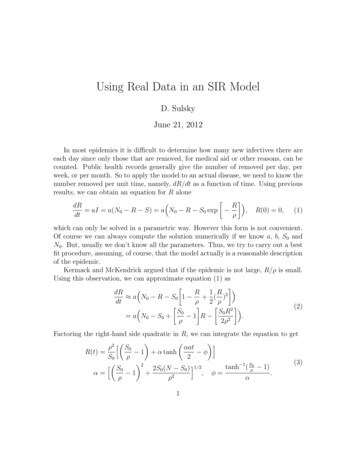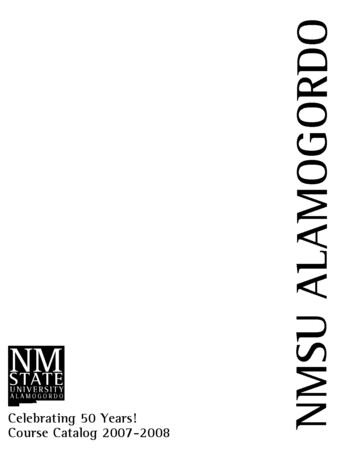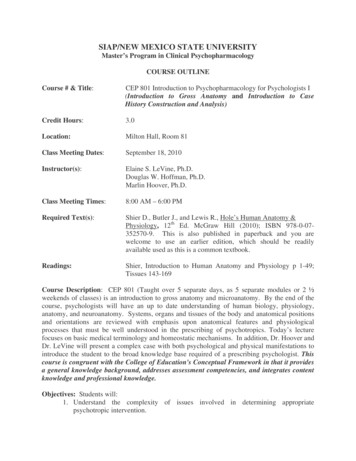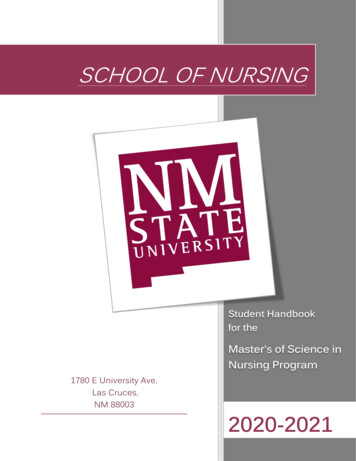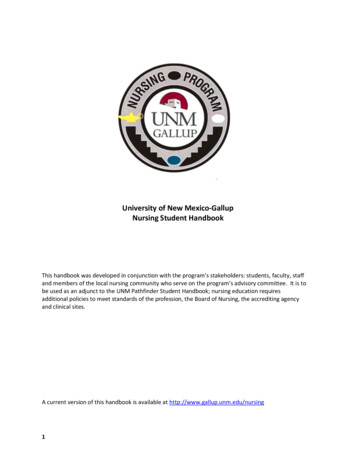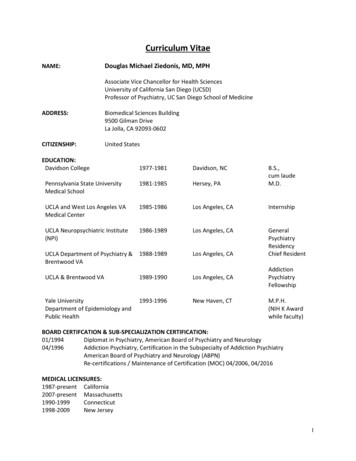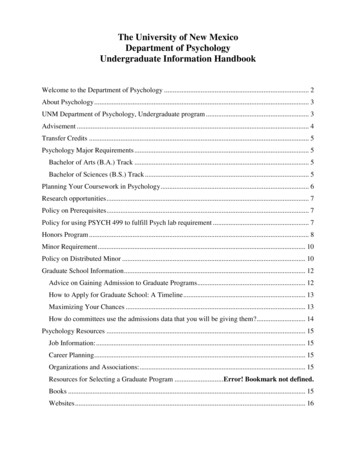
Transcription
The University of New MexicoDepartment of PsychologyUndergraduate Information HandbookWelcome to the Department of Psychology . 2About Psychology . 3UNM Department of Psychology, Undergraduate program . 3Advisement . 4Transfer Credits . 5Psychology Major Requirements . 5Bachelor of Arts (B.A.) Track . 5Bachelor of Sciences (B.S.) Track . 5Planning Your Coursework in Psychology . 6Research opportunities . 7Policy on Prerequisites . 7Policy for using PSYCH 499 to fulfill Psych lab requirement . 7Honors Program . 8Minor Requirement . 10Policy on Distributed Minor . 10Graduate School Information . 12Advice on Gaining Admission to Graduate Programs . 12How to Apply for Graduate School: A Timeline . 13Maximizing Your Chances . 13How do committees use the admissions data that you will be giving them? . 14Psychology Resources . 15Job Information: . 15Career Planning . 15Organizations and Associations: . 15Resources for Selecting a Graduate Program .Error! Bookmark not defined.Books . 15Websites . 16
Welcome to the Department of PsychologyWe welcome your interest in the Department of Psychology at the University of New Mexico.Please explore our website (http://psych.unm.edu) and learn about our faculty, research interests,and both graduate and undergraduate programs. Feel free to email any of us if you don’t findwhat you’re looking for here. New Mexico is blessed with a rich and diverse culture, as well asthe world’s best climate (in our humble opinion), making it a wonderful place to live and work.We have 26 regular faculty and 86 Ph.D. students. More than 1200 undergraduates have declaredPsychology as a major, making us one of the largest departments in the College of Arts &Sciences. The department offers a wide variety of courses, ranging from introductory psychologyto advanced courses in learning and memory, cognition, clinical/abnormal psychology, and brainfunction. Psychology is widely recognized for teaching excellence, and our professors have wonevery award offered by the university. Our undergraduate Honors Program is the oldest and bestin the University, with a two year rigorous program of studies culminating in an independentresearch project. Upon graduating our majors pursue diverse opportunities: psychology graduateschool programs, medical school, law school, mental health positions, and many more.Our internationally recognized research programs span such fields as addictions and drug abuse,animal learning, mate preference and mate choice, spirituality, assessment of knowledgestructures, psychotherapy outcomes, cognitive neuroimaging, health psychology, and traumaticbrain injury. Last year the Psychology Department’s external research grants exceeded 8million in funding. Faculty and graduate students conduct research in collaboration with manysuperb organizations, including CASAA, the MIND Institute, Sandia and Los Alamos NationalLaboratories, and the Veterans Administration (see individual faculty interest pages). Our researchprojects and collaborations are constantly evolving, so check back again and find out what’snew. Thanks for your interest in our program, and let us know if you need more information.Jane Ellen Smith, Ph.D.Professor and Chair2
About PsychologyPsychologists study the human mind and human behavior. Research psychologists investigate thephysical, cognitive, emotional, or social aspects of human behavior. Psychologists in healthservice provider fields provide mental health care in hospitals, clinics, schools, or privatesettings. Psychologists employed in applied settings, such as business, industry, government, ornonprofits, provide training, conduct research, design systems, and act as advocates forpsychology.Like other social scientists, psychologists formulate hypotheses and collect data to test theirvalidity. Research methods vary with the topic under study. Psychologists sometimes gatherinformation through controlled laboratory experiments or by administering personality,performance, aptitude, or intelligence tests. Other methods include observation, interviews,questionnaires, clinical studies, and surveys.Psychologists apply their knowledge to a wide range of endeavors, including health and humanservices, management, education, law, and sports. In addition to working in a variety of settings,psychologists usually specialize in one of a number of different areas.UNM Department of Psychology, Undergraduate programIf you have come as far as obtaining and reading this booklet, you probably already knowsomething about the Department of Psychology. Perhaps you have already decided to major orminor in Psychology, or maybe you are just considering it.People have many different reasons for wanting to major or minor in Psychology. Some arefascinated with behavior—they love to watch the world around them and are curious to learnabout why people behave as they do. Some want to learn more about themselves and becomehealthier people. Some plan to become psychologists themselves. Others are planning to go intoone of the many professions where a psychology background can be helpful: business, teaching,medicine, nursing, law, social work, pastoral ministry, engineering and human factors,counseling, child development, biology, and administration.Our faculty and staff in the Department of Psychology are here to help you learn and to help youpursue the study of psychology as you approach your personal and career goals. Our # facultyhold doctoral degrees from major universities, and represent a broad range of specializations.Among the major interest areas represented in the department are:Addictive BehaviorsClinical PsychologyCognitive PsychologyCross-Cultural PsychologyDevelopmental PsychologyEthics of ResearchHuman Factors and Human PerformanceLearning and MemoryNeuropsychologyPersonalityPsychobiology and NeuroscienceQuantitative PsychologyA list of our faculty and their specific interests may be obtained from our web page or in theDepartment of Psychology.This handbook outlines the requirements necessary to major in Psychology and clarifies somedepartmental regulations for majors. While this handbook provides the formal guidelines, you3
are required to visit an advisor in the College of Arts and Sciences located in the UniversityAdvisement and Enrichment Center, Suite 135, Bldg 85, 277-4621 or visit their web page athttp://artsci.unm.edu.PLEASE NOTE: This guide is not intended to replace the UNM catalog or the College of Artsand Sciences guidelines. It is intended to supplement these sources and to summarizeinformation relevant to Psychology Majors. Students are strongly encouraged to review theUNM Catalog at http://catalog.unm.eduPsychology majors must be admitted to the College of Arts and Sciences, which has its ownrequirements for admission and graduation. If you are not already enrolled in the College andaware of its requirements, you should consult the UNM Catalog and visit the CollegeAdvisement Center located in the University Advisement and Enrichment Center, Suite 135,Bldg 85, 277-4621.Students who elect psychology as a major will earn a Bachelor of Arts (B.A.) or a Bachelor ofScience (B.S.) degree. Both provide training in the theories and practices of psychology.AdvisementAcademic advising is one of the most important aspects of your college experience. Youracademic advisor can be an important resource for you beyond merely helping with the selectionof your courses.The College of Arts & Sciences has undergraduate program advisors for the Department ofPsychology. They are able to assist you with both major and college requirements. They dividetheir time between the department and the college office. Students are encouraged to also visitwith the advisor for their minor or second major as applicable.Appointment times and walk-in inquiries can be found in Lobo Achieve.http://loboachieve.unm.edu.Sign in with your UNM net ID and password and search for an undergraduate psychologyadvisor if they do not come up in your Success Network. You can also view walk-in houravailability there. Please do not schedule appointments more than two weeks out. Appointmentsscheduled farther than that may be canceled. Contact the department or the college office if yourun into any problems scheduling.The Department of Psychology also has a Coordinator of Student Advisement. You can meetwith the coordinator to discuss graduate school preparation and transfer credit evaluations.The advisors for the department will hold regular walk-in hours each semester. These hours areposted on the department web site and in the department.4
Transfer CreditsIf you are transferring credits from another university, you must have your official transcriptssent directly to the Office of Undergraduate Admissions, NOT the department. The Office ofAdmissions will review transfer courses and determine whether or not UNM will accept thecoursework, they will then process a Transfer Credit Evaluation (TCE). Once courses areapproved for transfer to UNM, the Coordinator of Student Advisement will evaluate Psychologycourses approved in your TCE and determine which courses can be applied towards apsychology major (or psychology minor). No more than 18 credit hours may be acceptedtowards a psychology major in Psychology (no more than 17 if an upper division lab is used tosatisfy major requirements); no more than 9 credit hours may be accepted towards a psychologyminor.You can view your TCE on your degree audit. It is located towards the end, after your unofficialtranscripts.Psychology Major RequirementsBachelor of Arts (B.A.) TrackTo obtain a B.A. in Psychology a student must complete satisfactorily 36 credit hours inPsychology (35 credit hours if an upper-division lab is taken) with a grade of C or better(grades of C- are not accepted), and should minor in a College of Arts and Sciencesdepartment. Other minors may be acceptable if approved in advance by the College of Arts &Sciences.1.PSY 105 (3 credits)2.PSY 200 (3 credits)3.Four courses (12 credits) selected from our six 200 level core courses: PSY 220,PSY 240, PSY 260, PSY 265, PSY 271, and PSY 280.4.PSY 302 (3 credits).5.Four courses at the 300/400 level (12 credits).6.One Psychology elective, upper division recommended (3 credits). Students mayelect to take an upper-division lab as an elective (2 credits).Bachelor of Sciences (B.S.) TrackTo obtain a B.S. in Psychology a student must satisfactorily complete 35 credit hours inPsychology with a grade of C or better (grades of C- are not accepted) as listed below. Thestudent must minor in one of the following: Biology, Chemistry, Computer Science,Mathematics, Statistics, Physics, or Evolutionary Anthropology1. PSY 105 (3 credits)2. PSY 200 (3 credits)3. Four courses (12 credits) selected from our six 200 level core courses: PSY 220, PSY240, PSY 260, PSY 265, PSY 271, or PSY 280.4. PSY 302 (3 credits).5. Four courses at the 300/400 level (12 credits).6. One upper-division (300/400) Psychology lab (2 credits).5
Planning Your Coursework in PsychologyAll Psychology students begin with the basic general psychology. One lecture course (PSY 105)serves as a full introduction to the discipline of Psychology. This course is required for allPsychology majors and minors.Statistics and research methodology are basic tools needed by all Psychology majors. PSY 200(Statistical Principles) provides an introduction to probability theory and descriptive andinferential statistics as they are used in behavioral sciences. It is required of all majors andshould be taken before you begin taking upper-division coursework in psychology. ResearchTechniques, PSY 302, teaches basic principles of research design and methodology. This courseshould be taken after PSY 200, and is required by all majors. All majors intending to pursuegraduate study in Psychology are strongly urged to complete Intermediate Statistics, PSY 300,and History of Psychology, PSY 400.Other coursework at the 200 level is designed to introduce you to specific areas of psychologyand to prepare you for more advanced study in these areas. The only prerequisite for thesecourses is a background in General Psychology (PSY 105). The regularly offered courses at thislevel at UNM are:220260271Developmental PsychologyLearning & MemorySocial Psychology240265280Brain & BehaviorCognitive PsychologyHealth PsychologyAlso consider which courses are prerequisites for more advanced coursework that you wish totake. With rare exceptions, courses at the 200 level are offered at least once a semester includingthe summer.Courses at the 300 and 400 levels are for advanced study in specialization areas withinPsychology. Most of these require a prerequisite course at the 200 level, and some have anoptimal advanced lab to accompany them (see UNM catalog). A few courses at this level areoffered every semester (PSY 331, 332), but most are offered once a year or less.You can find courses in a particular specialty by noticing the middle number of the listing, whichtells you the area of Psychology with which the course is primarily concerned. The middlenumber code is as follows:0 Basic Psychology and Methodology1 Applied Psychology2 Developmental Psychology3 Clinical Psychology and Personality4 Psychobiology and Neuroscience5 Special Topics6 Learning, Cognition, Motivation, and Perception7 Social Psychology8 Health Psychology9 Advanced Individual Topics, HonorsFor example, PSY 240 (Brain and Behavior) has a “4” in the middle and therefore is a course inthe area of Psychobiology and Neuroscience. Similarly, PSY 332 (Abnormal Behavior) is aClinical Psychology course.6
Research opportunitiesUNM undergraduates can learn more about conducting psychology research by participating as amember of a research team. Arrangements are made between the student, faculty member,and/or the psychology graduate student who will supervise the work. Academic credit isavailable to students who participate in these research opportunities by enrolling in PSY 499. Itis recommended that the student first pass the statistics and research methods coursework beforebeginning PSY 499. For further information, contact the Psychology Department’s studentadvisor.Policy on PrerequisitesStudents majoring or minoring in Psychology are required to meet all prerequisites forPsychology coursework. The university may deny credit if prerequisites are not met.Policy for using PSY 499 to fulfill Psychology lab requirementPSY 499 Information and InstructionsResearch Opportunities (PSY 499)UNM undergraduates can learn about conducting psychology research by participating as a member of aresearch team. Arrangements are made between the student, faculty member, and/or the psychologygraduate student who will supervise the student’s work. Academic credit is available to students whoparticipate in these research opportunities by enrolling in PSY 499.PSY 499 PoliciesStudents may enroll in 1-3 credit hours of PSY 499 per a semester and may take no more than six (6)credit hours total. Students must earn a grade of C or better (C- will not be accepted). It is highlyrecommended that students complete PSY 200 (Statistical Principles) and PSY 302 (PsychologicalResearch Techniques) before taking PSY 499. The instructor’s permission is required to enroll in PSY 499.Petition to use PSY 499 as a Lab CourseAt the beginning of the semester and/or during preregistration: The faculty sponsor will direct the student to sign up for two or three credits of 499. The student will choose a topic to write their APA style paper about in consultation with thefaculty sponsor and/or the graduate student. The length and contents of the paper are stipulated by the faculty sponsor. The student will work on the paper over the course of the semester as guided by the facultysponsor/graduate student. Once the final grade is calculated, the student will take the petition form to the faculty sponsorfor an approval signature if they have satisfactorily completed.7
The student will turn in the completed petition form to an Undergraduate Program Advisorduring finals week or the week following.Failure to complete the paper will result in the hours for 499 not applying to the major’slaboratory requirement. The hours will count in the degree as any other upper division coursewould.Honors ProgramEach year a small number of qualified psychology majors are admitted to the department’sHonors program. The Honors program is designed to provide intensive and personal instructionfor selected students who intend to pursue graduate or professional study. All students acquireadvanced knowledge and skills in psychology and conduct their own research projects.For over twenty years the Psychology Department has offered an Honors Program in Psychologyfor qualified Psychology majors. It is our goal that all potentially interested and qualifiedstudents are made aware of the existence of the Honors Program so that they may considerwhether they would like to apply for entrance into the program. The program involves a total of12 semester hours distributed over the Junior (PSY 391, 392) and Senior (491, 492) years. In thesenior year each student works with an individual faculty advisor to design and complete anindividual research project. Upon completion of the program and recommendation by thePsychology faculty, students will graduate with
medicine, nursing, law, social work, pastoral ministry, engineering and human factors, . Also consider which courses are prerequisites for more advanced coursework that you wish to take. With rare exceptions, courses at the 200 level are offered at least once a semester including . The Unive
